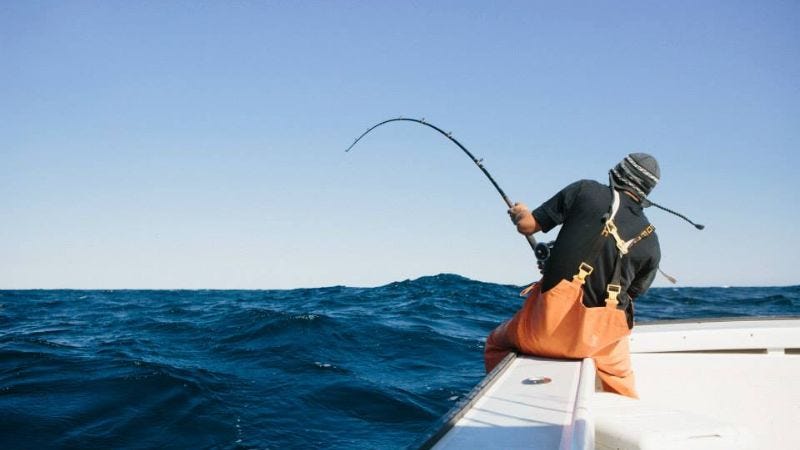Indy Film Fest -- Last Man Fishing

"Last Man Fishing" is a top-notch documentary that takes a point of view but convinces rather than browbeats. It looks at the plight of the individual fisherman going up against a monolith of corporations looking to squeeze him out, while environmental restrictions aimed at protecting the planet's fish populations end up becoming just one more mechanism putting a thumb on the little guy.
Directed by JD Schuyler, who also served as photographer, this is sort of a landlubber's eye view of life on the coasts, especially New England, Oregon and Alaska. We meet a dozen or so lifelong fisherfolk as well as their children taking up the mantle, as well as activists, academics and so on. We go inside the little-known regional fisheries panels that control the business of who pulls up what fish, and how much.
I learned a lot of things I didn't know, like jib fishing -- basically the oldest form of fishing known to man, with lines and hooks where fish are caught one by one, or at most two or three. It has the least impact on the environment, both in terms of what they take from the sea and the effects on the ocean ecology. Not to mention, a handful of people aboard a 30-foot boat burn a fraction of the resources of the big industrial net fishers in their giant ships.
Things like bottom trawling involve setting out nets miles long, even with wheels attached so they cruise along the bottom of the ocean floor, churning it up and destroying the coral and other intrinsic parts of the ecosystem. This also results in massive amounts of bycatch -- in other words, species not meant to be caught in the nets. Big trawlers can account for up to 95% of all the fish caught of a particular type like halibut, which is then thrown back into the sea, usually dead already.
If this seems like yet another environmental film that's all angry complaints and warnings, "Last Man Fishing" also gives plenty of reason for hope, too. We learn that in the 1990s the worst of the worst net fishing methods, drift nets, were finally banned. Thirty miles long, they would rake the whole sea of everything it held: dolphins, seals, whales, every kind of fish there is. Populations began to rebound after watershed legislation was passed.
But then industrialization came in heavy, along with the moneymen and supply chains held by corporations. We learn of the system of "catch share management," which was intended to limit overfishing. But it became a commodity, where men in suits sit on land and make money by buying and selling licenses, never so much as getting their tootsies wet.
This ends up taking a bite out of the profits of people like Tim Rider, a New Englander who drives his boat out so far some days the harbor master wonders if he'll ever be seen again. Or Darius Kasprzak in Kodiak, Alaska, who's been fishing his whole life and seen an entire way of life disappear, formerly busy downtowns of coastal towns now abandoned.
In a twisting of the food chain, American fishermen catch off these coasts but then the whole fish are frozen, shipped to Asia to be cleaned and boned by labor one step up above slavery, then refrozen and shipped back here for sale and consumption at low prices.
Perversely, these fish get labeled as imports, even though they were caught in U.S. waters. Oftentimes it will even get mislabeled, intentionally or otherwise, as a different kind of fish. And since it's been processed and refrozen gosh knows how many times, no one can tell the difference between the mushy filets anyway.
"Who wants to fish the last fish?" asks one harbor master in Oregon, where the tide has started to turn the right way. The local fisherman partnered with researchers at Oregon State University to set aside a large chunk of water as a preserve where they can study the life cycle of the fish and figure out the right way to cultivate them sustainably.
In New England, Tim Rider stops selling his catch at the big fishery market at the pier -- what's the point, when his tiny catch is going up against 50,000 pounds ripped from the sea in giant nets? Instead, he starts a business catering to restaurants hungry for high-quality, direct-sourced fish that can go from swimming to plate in eight or 10 hours. First he delivers his wares in a cooler from his minivan, but soon he can buy a refrigerated truck... then two.
Gorgeously photographed with excellent editing (by Michael Lahey), "Last Man Fishing" is the best kind of documentary because it introduces you to a community you didn't know and teaches you about their way of life and why they cling to it. By the end, you feel like you understand these hardworking, simple people and are part of the same family with the same shared goals.
High-grade food for thought, and it makes me hungry for poached halibut cheeks.
[embed]https://www.youtube.com/watch?v=Ddel2dxLfOM[/embed]



